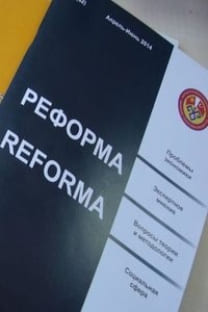İSLAMÎ FİNANSIN EKONOMİK KALKINMADAKİ ROLÜ
Bu makalenin amacı, kalkınmanın gerçek anlamını İslamî bakış açısından vermektir. Birçok Müslüman ülke azgelişmiş durumda bulunmaktadır. İslam’ın dinî ve sosyolojik ideolojisini bu ülkelerde kalkınma noktasında ahlaki ve etik değişim gerçekleştirmek ve kurumlar kurmak için hayli faydalı bir biçimde kullanmaktadır. İslam Hristiyan ve Yahudi teolojilere benzer bir biçimde faize mani olma konusunda bize bir şeyler söylüyor ve bu konudaki yegâne dinamik dindir. Ama aynı zamanda İslam karşılıklı ve kapsamlı ticaret ve finansman tarzları açısından önemli imkânlar sunuyor, bu imkânlar diğer herhangi bir dinde veya sosyal düzende bu denli kolay ve eksiksiz bir izahına rastlamak mümkün değildir. Toplam Faktör Verimliliği (TFP) denilen, kolektif verimlilik için geliştirilmiş modern kavram İslam içinde kullanılmakta, İslam materyalist ekonominin bencilliği ve bireyciliğinden uzak durmaktadır. Batılı kimi akademisyenler İslamî bankacılığın kullanımını ekonomik kalkınma için daha faydalı görmekte, kimileri de İslam’ı Müslüman ülkelerin kalkınması önünde bir tehdit ve engel olarak değerlendirmektedir. Umarız bu makale ilgili çalışma sahasına yeni, kıymetli bir teorik katkı sunarak faydalı olacaktır. Bu makele iki ana kısımdan oluşmaktadır: 1) İslam ve Ekonomik Kalkınma, 2) Ekonomik Kalkınmaya İslami Finansın Gelişimi.
Anahtar Kelimeler:
islami finans, ekonomik kalkınma, yoksulluk
THE ROLE OF ISLAMIC FINANCE IN ECONOMIC DEVELOPMENT
The drive of this working paper is to stretch the real implication of development from Islamic viewpoint. Most of Muslim countries are LDCs and using the religious and social belief of Islam is very beneficial to create institutions and to take ethical and moral change for development in these countries. Islam seems to be the only dynamic religion and talks us about deterrence of interest, similar to Christian and Jewish theologies. But at the same time provides a complete setoff trade and financing modes, not simply and totally defined in any other religion or social order. Even TFP, a new concept for united competence has been advised in Islam, ostracism to self-centeredness and uniqueness of worldly finances. Approximately professors of WEST consider use of Islamic Finance more suitable for economic development, while others reflect Islam as obstacle & threat to development of Muslim countries. We confidence that the Study will be beneficial in this regard to deliver another valued hypothetical measurement to this arena of study.
Keywords:
islamic finance, economic development,
___
- Ali, Muhamad. Islam and Economic Development in New Order’s Indonesia (1967-1998), Journal of East-West Center Working Papers, 2004.
- Askari, Hossein. Iqbal, Zamir. Understanding Development in an Islamic Framework, Journal of Islamic Economic Studies, Vol. 22, No. 1, May, 2014.
- Iqbal, M., & Ahmad. T. Islamic Finance and Economic Development, Journal of Economic Cooperation and Development, 2003.
- Hasan, Zubair. (1995). Economic Development in Islamic Perspective: Concept, Objectives, and Some Issues. Journal of Islamic Economics, 1995.
- Aziz, Zeti Akhtar. Islamic Finance: Promoting Real Economic Development. Published by Malaysia International Islamic Financial Centre (MİFC), 28 October 2015.
- Furqani, Hafas. Mulyany, Ratna. İslamic Banking and Economic Growth: Empirical Evidence from Malaysia, Journal of Economic Cooperation and Development, 2009.
- Saleem, Shahid. Role of Islamic Banks in Economic Development, Journal of Gradate research assignment at Hailey College of Banking and Finance, University of Punjab, February 2008.
- ISSN: 1694-5158
- Yayın Aralığı: Yılda 2 Sayı
- Başlangıç: 1999
- Yayıncı: Kırgızistan Türkiye Manas Üniversitesi
Sayıdaki Diğer Makaleler
İSLAMÎ FİNANSIN EKONOMİK KALKINMADAKİ ROLÜ
THE FACTORS OF STABILITY OF THE BANKING SYSTEM
MODELING THE DYNAMICS OF THE EXCHANGE RATE IN KYRGYZSTAN
BAĞIMSIZLIK DÖNEMİNDE KIRGIZİSTANIN EKONOMİ POLİTİĞİ
ECONOMIC DEVELOPMENT AND THE POSSIBILITY OF ECONOMIC INTEGRATION IN CENTRAL ASIA
ECONOMIC FACTORS AFFECTING THE QUALITY OF MEDICAL SERVICES IN KYRGYZSTAN
Damira Japarova, Damira Baygonushova
TERRITORIAL IDENTIFICATION AND SOCIO-ECONOMIC DEVELOPMENT OF MOUNTAIN COMMUNITIES
THE REFORMS CARRIED OUT IN THE PUBLIC PROCUREMENT SYSTEM OF THE KYRGYZ REPUBLIC
